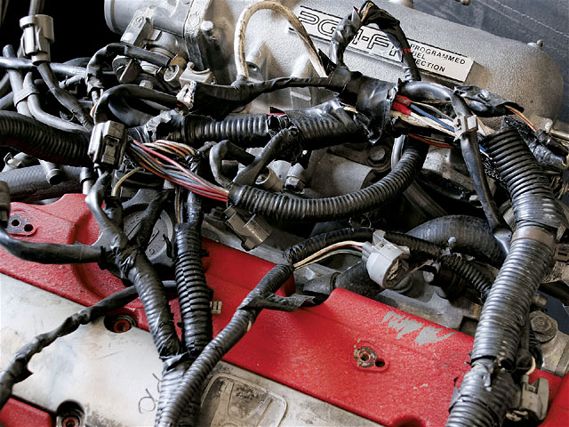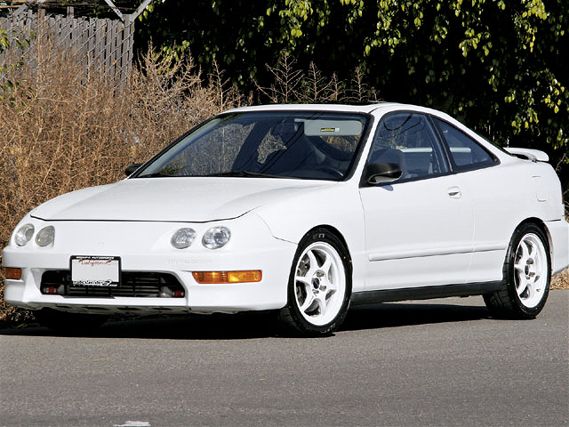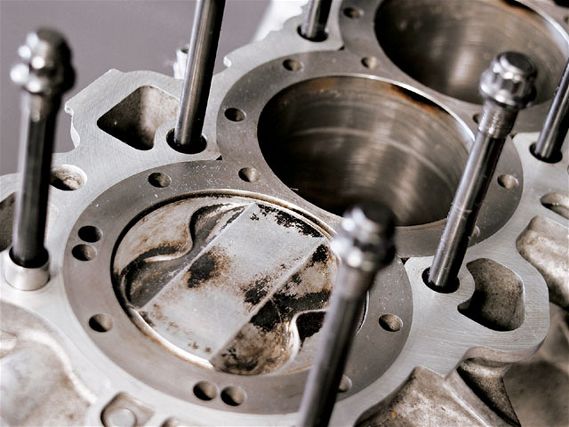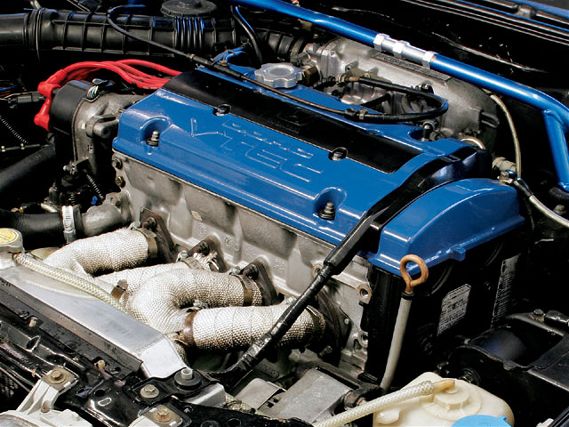 | Honda Engine Swap and Wiring Harness Questions Answered - July 2008 Exhaust Notes
| Honda Engine Swap and Wiring Harness Questions Answered - July 2008 Exhaust Notes
B-Series Engine Harness How-To
What's up? I have a '97 Honda Civic DX automatic and I just bought a '97 Acura Integra LS five-speed manual swap with the ECU and wiring harness. I would like to know, do I need to use the Integra harness for the swap or would I need to use the Civic harness? I have been looking for info on this specific swap on different forums but have had no luck. I would greatly appreciate your help on this and for you to direct me to any sites that have installation procedures for a B18B five-speed in a '97 Honda Civic DX and how to install the wiring harness. I truly appreciate your help. Also, keep up the good work on the magazine; I really enjoy all the articles you have on all of the different Civics.
Javier Ruiz / New Jersey
Since your Civic is of the '96-'00 body style, its engine harness orientation is entirely different than the '94-'01 Integra, which happens to be more similar to the '92-'95 Civics. In short, you need to reuse your Civic's engine harness but you'll have to readjust its length to fit the B-series sensors appropriately, however, the procedure is relatively simple. Of course, the Integra harness would fit the Integra engine perfectly since that's where it came from but you'll have a heck of a time integrating it to your chassis harness and to your ECU. Your Civic harness is obviously already compatible with your vehicle and ECU so all you need to do is modify it to reach the various B-series engine sensors that are located in slightly different places than your D's. You can do so by connecting the injector harness plugs first and then seeing what reaches and what doesn't. Also, since you have a DX you'll need to swap the idle air control valve plug as well as the crankshaft position sensor plug for the Integra ones. Really though, since you're not even going to be messing with VTEC wiring, you're about to tackle one of the simplest conversions known to the Honda world.
Injectors And Resistor Boxes Continued
Hello. I just wanted to give you a shoutout about your magazine. I like it so much, I'm always running to check the mail when it's time for you guys to come out with it. But what's up with one issue every two months? Anyway, on your April article about the injectors you explained how to check the injectors but what about the resistor box? Well, you just say that you need to get the one out of the car that you get the injectors from but I was wondering, since so many people sell injectors in the sizes that you need, if there is a way to check the resistor box for the one that you need?
Corey / Hampton, Va.
Some Honda resistor boxes may look different from one another but internally they're all the same-each creates roughly 9-10 ohms of resistance. Similarly, there is only one type of low impedance fuel injector, which measures in around 2-3 ohms, despite the brand, engine, or platform. If you have such low impedance, peak, and hold injectors, any Honda resistor box will work for you since they all do the same thing. Heck, there's even Mitsubishi and Toyota resistor boxes that will get the job done just fine.
How Low Can You Go?
I have been searching for a lowering kit for my '01 Honda Civic LX four-door. Why can't I find a kit that lowers the car more then 1.3 inches? For all of the other Civics there are lowering kits for 2.5 inches and such but why not this model? If you have any information on a kit for this car, please let me know.
Drew / Stanwood, Wash.
It sounds like you haven't looked into adjustable coilovers. Eibach's Pro-Street coilover kit is adjustable between 1.4-2.6 inches-that's 0.1 inch lower than "all of the other Civics." Of course, with such an excessive drop you'll need to be particularly cautious of your wheel and tire package as well as your alignment settings because such ride a height can wreak havoc on your fender liners, tire tread, even handling characteristics. Eibach also offers an alignment correction kit for your vehicle, which you should definitely consider, regardless of whether your drop your Civic an inch or 3 inches. Keep in mind that as your Civic's suspension compresses, or lowers, cambers decreases, which is an easy way to ruin an otherwise good set of tires from uneven tread wear.
 | Honda Engine Swap and Wiring Harness Questions Answered - July 2008 Exhaust Notes
| Honda Engine Swap and Wiring Harness Questions Answered - July 2008 Exhaust Notes
The $6,500 Question
Hi, I have subscribed to this great magazine for about three years. I would like your opinion on what Honda would be the best starter five-speed to mod out? I have roughly $6,500 to spend and it will be my third vehicle. It will not be a daily driver. Thank you, I anxiously wait for every issue of Honda Tuning.
Blake Merrill / Pleasant Grove, Ala.
You could spend your $6,500 several different ways but we'll try to narrow it down to a few of the more common ones. The easiest way would be to dump the whole wad on a '94-'95 Integra GSR. The factory-equipped B18C1 will save you from an engine swap and the GSR is already outfitted with four-wheel disc brakes and a fairly close-ratio gearbox. If you're lucky, you might end up with a leather interior for that price. The downside is that this will wipe out your budget and you haven't even begun to make the car better. Your second option is to shell out about half your budget on a '92-'95 Civic and put the rest toward an engine swap. You'll have just enough left over for a B16A or B18C transplant-provided you can install it yourself-that will make your EG just a bit faster than the GSR simply because it's lighter. Of course, there's also the '88-'91 chassis Civic, '92-'96 Prelude VTECs, and pre-'98 Accords, which will only make your decision even tougher. Keep in mind that while the older Civics are a lot cheaper they'll also require aftermarket components when it comes to twin-cam engine swaps but the EGs do not. As for the Preludes and Accords, well, both of these are even heavier than the Integra, which means they'll require more modifications just to keep up, but don't let that discourage you from going the H-series route.
 | Honda Engine Swap and Wiring Harness Questions Answered - July 2008 Exhaust Notes
| Honda Engine Swap and Wiring Harness Questions Answered - July 2008 Exhaust Notes
Blow-Up Prevention 101I have a B18A1 that I want to turbocharge. I have a T3/T4 turbo setup to put on it but my problem is that I want to keep the factory compression yet still boost high and use it as a daily driver. I have a bunch of bolt-ons, I just don't know much about internals. Could you help me?
Thanks, Luis Rosado / Providence, R. I.
First off, forget about how much you want to boost and focus on how much power you want to make. Second, compression is not your problem. The B18A1 measures in at a conservative, boost-friendly 9.2:1 ratio. You simply don't need to go any lower than that. The problem is the B18A1's weak internals, specifically its cast pistons. Depending upon how well your system is dialed in, how worn your engine is, and how conservative your tune is in terms of air/fuel ratios, B-series piston ring lands tend to fail in the 250-300hp zone, give or take a bit. Of course, this is a generalization and much depends on the state of your engine but, for the most part, it's a good target for you. B-series connecting rods and cylinders are the next weak link, although they're certainly capable of more than 300 hp worth of abuse. However, if you plan on swapping your pistons out to forged components, it would make very little sense to not address the rods at the same time. B-series bottom ends beefed up with nothing more than forged pistons and rods have been proven to produce more than 500 hp reliably. Whether or not you need to sleeve the cylinders with ductile iron liners is open to interpretation. While it can't hurt, it's certainly not the most cost-effective modification for a 300hp B-series. There are cheaper alternatives, like block guards, which have been proven to stabilize the cylinders for a lot less money. Of course, any time you tackle a bottom end buildup you'll want to have the cylinders professionally honed (bored if necessary), size and install new rod and main bearings, resurface the block's deck for a positive head gasket seal, have the entire reciprocating assembly balanced, and, at the very least, inspect the oil pump for wear. Follow these guidelines and your short-block will be the last of your worries.
 | Honda Engine Swap and Wiring Harness Questions Answered - July 2008 Exhaust Notes
| Honda Engine Swap and Wiring Harness Questions Answered - July 2008 Exhaust Notes
Prelude Rebuild...AgainHello Honda Tuning. I'm a big fan of what you do. I've got a bit of a problem and am hoping you can help. I have a '95 Honda Prelude Si. You know the specs, but it's a 2.3L DOHC five-speed with just a cold-air intake and a ROUSH Mustang exhaust that was on there from the previous owner. I replaced the engine a year ago after throwing a rod through the block because the turd who owned it before had the wrong people rebuild the original engine (the rod bolt wasn't tight and was sitting in the pan). Now I'm back to where I was two years ago. My question is: I'm looking for one overall company to buy my internals for the engine. I'm going to do a Tennessee Pride move with a VTEC head but I want to do a turbo and maybe nitrous oxide later on down the road. I've narrowed it down to three major companies and would like your advice on which one would be best suited for my Christine (her name). I'm leaning toward HKS for its overall applications but the hot-rod in me wants to go with Edelbrock. I also know that Skunk2 has a lot of what I need. I understand if you don't want to pick a single company because all advertise in your mag, but any help is better than none at all. Thanks for your help in advance and I hope to get her in your mag within the next two years. Please keep up the amazing work.
Shaun Pilcher
Skunk2 is the only company you mentioned that offers much in terms of what you'll need. They can take care of you as far as valvetrain components go but you'll need to look elsewhere for beefing up that block. We're guessing your shooting for fairly high power figures based on your turbo/nitrous aspirations. As such, you'll need to outfit your block with forged pistons and connecting rods as well as ductile iron sleeves. There are a number of companies that make what you need so don't be afraid to pick and choose. Using pistons from one company and connecting rods from another is more common than it isn't. As long as the parts are compatible with one another there's really nothing wrong with mixing brands. Trust us, your block won't care either way.
HatersI'm writing in response to Aaron Bonk's piece: "Honda: The American Japanese Car Company" (May '08). I can relate to all of that redneck stuff to an unbelievable extent, mostly because I live in the redneck motherland of Montana. People actually hate me and wish me harm because I drive a Honda. My '97 Accord coupe and '93 Accord EX are like giant signs to the rednecks screaming: vandalize me. My cars have fallen to countless instances of vandalism, including writing "f**k Honda" in sharpie on my car, spray painting, garbage, tobacco spit, beer bottles, rocks, baseball bats, and many others. Reading my new Honda Tuning today was an enlightening experience (as always) on an otherwise crappy day.
Thanks for the great mag, Zach Demaray
Glad you could relate to the article, although it's a shame to hear just how bad things are outside of our region.
Got Questions, Comments, Love Or Hate?
Send Your Letters To:
[email protected]
Or Snail Mail To:
2400 E. Katella Avenue, Suite 1100
Anaheim, CA 92806
